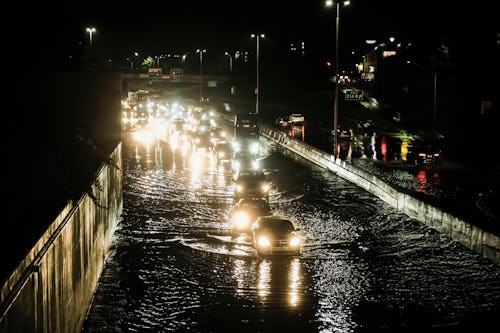
If you have ever considered your zombie apocalypse survival plan, you've almost certainly concluded that the best place to be to survive the end-of-the-world event is somewhere isolated, and preferably surrounded by water. As it turns out, science agrees with you — it's just that the event threatening our survival isn't a zombie takeover; it's climate change.
A new Global Sustainability Institute study published in the journal Sustainability did the work of ranking the locations best suited to survive a global societal collapse stemming from climate change-led destruction. The results: Islands and other sparsely populated, remote locations are the best places to post up for the end times — though take that with a grain of salt, because no place will go entirely untouched by the planet's continued warming and ensuing fallout.
According to researchers, New Zealand, specifically, is the best location to live in as climate change rears its ugly head. It's an unsurprising choice, as the country checks a lot of boxes for survivalists: It's a remote island with vast, largely untouched landscapes that, in a survival scenario, amount to untapped resources. And it seems there's some agreement about New Zealand's merits when it comes to potential global societal collapse. According to the University of Notre Dame’s Global Adaptation Initiative, which similarly ranks countries based on their readiness and capability to adapt to climate change, New Zealand ranks second out of 181 countries, behind only Norway. It might get cut off from the global supply chain, seeing as it's floating out in the Pacific Ocean — but the worst-case climate scenarios suggest the global economy will collapse anyway, so nothing to worry about there.
The new study isn't the first to peg New Zealand as a solid outlet for survival. Silicon Valley billionaires have been eyeing the island for years as a potential outpost in case things go to hell. According to a report from The Guardian, people like Peter Thiel and several cryptocurrency millionaires have already started buying up property and building bunkers in the country. It's something to keep in mind if you move to New Zealand: Sure, you might survive climate change, but think of who your neighbors would be.
If New Zealand starts to fill up before you get there, the second-best spot, per the report, is just a short swim over in Tasmania, a small Australian island. Tasmania claimed the silver medal in the survival Olympics thanks to its thriving agricultural infrastructure, which is built to sustain if everything goes to shit. That said, it's a small island that likely can't support a huge population uptick, so don't expect to be greeted like a hero when you show up as the world is ending. But if you can get in, odds of survival are pretty good.
The final nation on the podium for survival is Ireland. Like the two countries placing ahead of it, Ireland is an island that benefits from isolation and self-sustainability (sensing a theme here?). Ireland is resource-rich with a booming agriculture industry that could be tapped to keep its population alive as the global supply chain crumbles. Plus, the fact that Ireland exports a lot more than it imports positions it well for turtling and turning inward in the face of societal collapse.
Iceland fell just short of the top three, placing fourth on the strength of its agricultural potential and capacity to support renewable energy. The fact that it is a remote island sure doesn't hurt, either, though it's also getting clobbered by climate change as we speak, with oceans rising at a rate of 1.4 inches per year as nearby glaciers melt.
The United Kingdom placed fifth on the researcher's list, driven largely by its potential to survive rather than its demonstrated ability. The densely populated island was tagged as a country that could considerably increase its renewable energy and agricultural capabilities, though it currently imports nearly half of its food and is lagging on wind and solar adoption. The U.K. was previously identified as one of the top 10 nations that could provide a sustainable future, according to a study published by the World Health Organization and the United Nations Children’s Fund (UNICEF).
The sixth spot on the list is a bit crowded, as the United States and Canada managed to tie in their likelihood for survival — though they have a lot of challenges to overcome. The shared border between the two nations — the largest and most populated on the list — hurts both, due to the risk of mass migration. Both have lots of land that can be tapped for production, agriculture, and energy generation; but both are also massive importers, meaning they would have lots of ground to make up if access to the rest of the world's resources were cut off by climate change.
As The New York Times highlighted, there are shortcomings to rankings like this one, including focusing too much on wealthy nations and failing to account for governmental and military responses. But the biggest shortcoming is thinking that it is possible to escape climate change. All of these countries will be affected. A better solution, rather than trying to position yourself in the place most likely to survive, is to actually address the issue at hand and keep global warming from worsening. It's not too late to actually do something about climate change, beyond running from the worst-case scenario.







